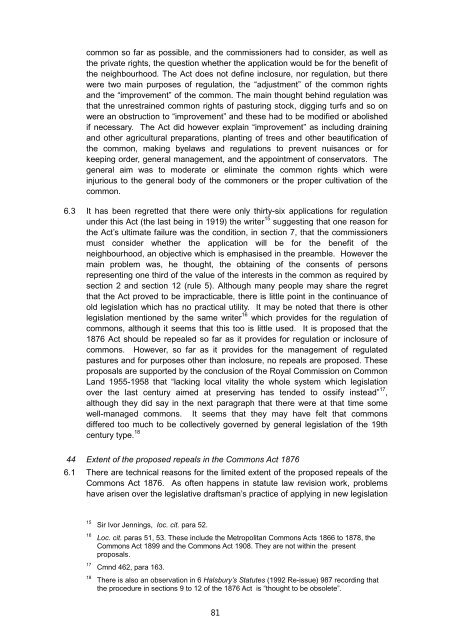STATUTE LAW REVISION: SIXTEENTH ... - Law Commission
STATUTE LAW REVISION: SIXTEENTH ... - Law Commission
STATUTE LAW REVISION: SIXTEENTH ... - Law Commission
You also want an ePaper? Increase the reach of your titles
YUMPU automatically turns print PDFs into web optimized ePapers that Google loves.
common so far as possible, and the commissioners had to consider, as well as<br />
the private rights, the question whether the application would be for the benefit of<br />
the neighbourhood. The Act does not define inclosure, nor regulation, but there<br />
were two main purposes of regulation, the “adjustment” of the common rights<br />
and the “improvement” of the common. The main thought behind regulation was<br />
that the unrestrained common rights of pasturing stock, digging turfs and so on<br />
were an obstruction to “improvement” and these had to be modified or abolished<br />
if necessary. The Act did however explain “improvement” as including draining<br />
and other agricultural preparations, planting of trees and other beautification of<br />
the common, making byelaws and regulations to prevent nuisances or for<br />
keeping order, general management, and the appointment of conservators. The<br />
general aim was to moderate or eliminate the common rights which were<br />
injurious to the general body of the commoners or the proper cultivation of the<br />
common.<br />
6.3 It has been regretted that there were only thirty-six applications for regulation<br />
under this Act (the last being in 1919) the writer 15 suggesting that one reason for<br />
the Act’s ultimate failure was the condition, in section 7, that the commissioners<br />
must consider whether the application will be for the benefit of the<br />
neighbourhood, an objective which is emphasised in the preamble. However the<br />
main problem was, he thought, the obtaining of the consents of persons<br />
representing one third of the value of the interests in the common as required by<br />
section 2 and section 12 (rule 5). Although many people may share the regret<br />
that the Act proved to be impracticable, there is little point in the continuance of<br />
old legislation which has no practical utility. It may be noted that there is other<br />
legislation mentioned by the same writer 16 which provides for the regulation of<br />
commons, although it seems that this too is little used. It is proposed that the<br />
1876 Act should be repealed so far as it provides for regulation or inclosure of<br />
commons. However, so far as it provides for the management of regulated<br />
pastures and for purposes other than inclosure, no repeals are proposed. These<br />
proposals are supported by the conclusion of the Royal <strong>Commission</strong> on Common<br />
Land 1955-1958 that “lacking local vitality the whole system which legislation<br />
over the last century aimed at preserving has tended to ossify instead” 17 ,<br />
although they did say in the next paragraph that there were at that time some<br />
well-managed commons. It seems that they may have felt that commons<br />
differed too much to be collectively governed by general legislation of the 19th<br />
century type. 18<br />
44 Extent of the proposed repeals in the Commons Act 1876<br />
6.1 There are technical reasons for the limited extent of the proposed repeals of the<br />
Commons Act 1876. As often happens in statute law revision work, problems<br />
have arisen over the legislative draftsman’s practice of applying in new legislation<br />
15 Sir Ivor Jennings, loc. cit. para 52.<br />
16 Loc. cit. paras 51, 53. These include the Metropolitan Commons Acts 1866 to 1878, the<br />
Commons Act 1899 and the Commons Act 1908. They are not within the present<br />
proposals.<br />
17 Cmnd 462, para 163.<br />
18 There is also an observation in 6 Halsbury’s Statutes (1992 Re-issue) 987 recording that<br />
the procedure in sections 9 to 12 of the 1876 Act is “thought to be obsolete”.<br />
81

















